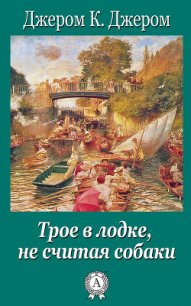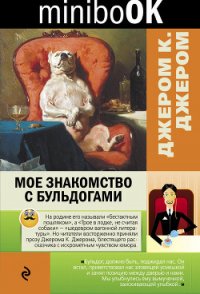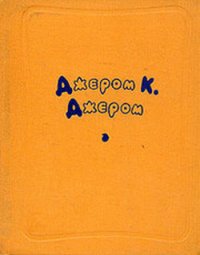Трое в лодке, не считая собаки / Three Men in a Boat (to Say Nothing of the Dog) - Джером Клапка Джером (прочитать книгу txt) 📗
Biggs’s boy, as I have said, came round the corner. He was evidently in a great hurry when he first dawned upon the vision, but, on catching sight of Harris and me, and Montmorency, and the things, he eased up and stared. Harris and I frowned at him. This might have wounded a more sensitive nature, but Biggs’s boys are not, as a rule, touchy. He came to a dead stop, a yard from our step, and, leaning up against the railings, and selecting a straw to chew, fixed us with his eye. He evidently meant to see this thing out.
In another moment, the grocer’s boy passed on the opposite side of the street. Biggs’s boy hailed him:
“Hi! ground floor o’ 42’s a-moving.”
The grocer’s boy came across, and took up a position on the other side of the step. Then the young gentleman from the boot-shop stopped, and joined Biggs’s boy; while the empty-can superintendent from “The Blue Posts” took up an independent position on the curb.
“They ain’t a-going to starve, are they?” said the gentleman from the boot-shop.
“Ah! you’d want to take a thing or two with YOU,” retorted “The Blue Posts,” “if you was a-going to cross the Atlantic in a small boat.”
“They ain’t a-going to cross the Atlantic,” struck in Biggs’s boy; “they’re a-going to find Stanley [20].”
By this time, quite a small crowd had collected, and people were asking each other what was the matter. One party (the young and giddy portion of the crowd) held that it was a wedding, and pointed out Harris as the bridegroom; while the elder and more thoughtful among the populace inclined to the idea that it was a funeral, and that I was probably the corpse’s brother.
At last, an empty cab turned up (it is a street where, as a rule, and when they are not wanted, empty cabs pass at the rate of three a minute, and hang about, and get in your way), and packing ourselves and our belongings into it, and shooting out a couple of Montmorency’s friends, who had evidently sworn never to forsake him, we drove away amidst the cheers of the crowd, Biggs’s boy shying a carrot after us for luck.
We got to Waterloo at eleven, and asked where the eleven-five started from. Of course nobody knew; nobody at Waterloo ever does know where a train is going to start from, or where a train when it does start is going to, or anything about it. The porter who took our things thought it would go from number two platform, while another porter, with whom he discussed the question, had heard a rumour that it would go from number one. The station-master, on the other hand, was convinced it would start from the local.
To put an end to the matter, we went upstairs, and asked the traffic superintendent, and he told us that he had just met a man, who said he had seen it at number three platform. We went to number three platform, but the authorities there said that they rather thought that train was the Southampton express, or else the Windsor loop. But they were sure it wasn’t the Kingston train, though why they were sure it wasn’t they couldn’t say.
Then our porter said he thought that must be it on the high-level platform; said he thought he knew the train. So we went to the high-level platform, and saw the engine-driver, and asked him if he was going to Kingston. He said he couldn’t say for certain of course, but that he rather thought he was. Anyhow, if he wasn’t the 11.5 for Kingston, he said he was pretty confident he was the 9.32 for Virginia Water, or the 10 a.m. express for the Isle of Wight, or somewhere in that direction, and we should all know when we got there. We slipped half-a-crown into his hand, and begged him to be the 11.5 for Kingston.
“Nobody will ever know, on this line,” we said, “what you are, or where you’re going. You know the way, you slip off quietly and go to Kingston.”
“Well, I don’t know, gents,” replied the noble fellow, “but I suppose SOME train’s got to go to Kingston; and I’ll do it. Gimme the half-crown.”
Thus we got to Kingston by the London and South-Western Railway.
We learnt, afterwards, that the train we had come by was really the Exeter mail, and that they had spent hours at Waterloo, looking for it, and nobody knew what had become of it.
Our boat was waiting for us at Kingston just below bridge, and to it we wended our way, and round it we stored our luggage, and into it we stepped.
“Are you all right, sir?” said the man.
“Right it is,” we answered; and with Harris at the sculls and I at the tiller-lines, and Montmorency, unhappy and deeply suspicious, in the prow, out we shot on to the waters which, for a fortnight, were to be our home.
Chapter VI
Kingston. – Instructive remarks on early english history. – Instructive observations on carved oak and life in general. – Sad case of stivvings, junior. – Musings on antiquity. – I forget that i am steering. – Interesting result. – Hampton court maze. – Harris as a guide.
It was a glorious morning, late spring or early summer, as you care to take it, when the dainty sheen of grass and leaf is blushing to a deeper green; and the year seems like a fair young maid, trembling with strange, wakening pulses on the brink of womanhood.
The quaint back streets of Kingston, where they came down to the water’s edge, looked quite picturesque in the flashing sunlight, the glinting river with its drifting barges, the wooded towpath, the trim-kept villas on the other side, Harris, in a red and orange blazer, grunting away at the sculls, the distant glimpses of the grey old palace of the Tudors, all made a sunny picture, so bright but calm, so full of life, and yet so peaceful, that, early in the day though it was, I felt myself being dreamily lulled off into a musing fit.
I mused on Kingston, or “Kyningestun,” as it was once called in the days when Saxon “kinges” were crowned there. Great Caesar crossed the river there, and the Roman legions camped upon its sloping uplands. Caesar, like, in later years, Elizabeth, seems to have stopped everywhere: only he was more respectable than good Queen Bess; he didn’t put up at the public-houses.
She was nuts on public-houses, was England’s Virgin Queen. There’s scarcely a pub. of any attractions within ten miles of London that she does not seem to have looked in at, or stopped at, or slept at, some time or other. I wonder now, supposing Harris, say, turned over a new leaf, and became a great and good man, and got to be Prime Minister, and died, if they would put up signs over the public-houses that he had patronised: “Harris had a glass of bitter in this house;” “Harris had two of Scotch cold here in the summer of ’88;” “Harris was chucked from here in December, 1886.”
No, there would be too many of them! It would be the houses that he had never entered that would become famous. “Only house in South London that Harris never had a drink in!” The people would flock to it to see what could have been the matter with it.
How poor weak-minded King Edwy [21] must have hated Kyningestun! The coronation feast had been too much for him. Maybe boar’s head stuffed with sugar-plums did not agree with him (it wouldn’t with me, I know), and he had had enough of sack and mead [22]; so he slipped from the noisy revel to steal a quiet moonlight hour with his beloved Elgiva [23].
Perhaps, from the casement, standing hand-in-hand, they were watching the calm moonlight on the river, while from the distant halls the boisterous revelry floated in broken bursts of faint-heard din and tumult.
Then brutal Odo and St. Dunstan force their rude way into the quiet room, and hurl coarse insults at the sweet-faced Queen, and drag poor Edwy back to the loud clamour of the drunken brawl. [24]




